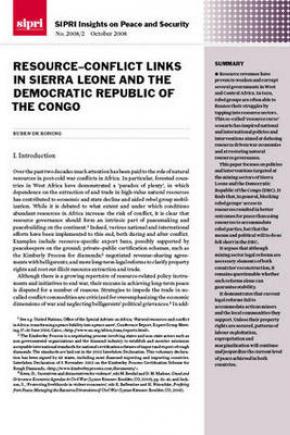Resource–Conflict Links in Sierra Leone and the Democratic Republic of the Congo
Resource revenues are argued to weaken and corrupt governments in West and Central Africa. In turn, these governments risk being challenged by rebel groups that are often able to finance their struggles by tapping into resource sectors that have fallen outside government control. This so-called ‘resource curse’ scenario has inspired national and international policies and interventions in several war-torn countries in Africa that are aimed at defusing resource-driven war economies and at restoring natural resource governance.
This paper focuses on policies and interventions targeted at the mining sectors of Sierra Leone and the Democratic Republic of the Congo (DRC), both during and after conflict. In both countries, blocking rebel groups’ access to natural resources and revenues has been a primary pursuit of peacekeeping operations. Additionally, governments and international mediators have also attempted to redistribute resource wealth and power over resources in order to forge peace agreements with rebel groups. In the present post-conflict periods, national governments prioritize promoting legal industrial operations and controlling artisan-mining activities, in order to generate economic revenues as well as prevent criminal activities and war financing. This paper finds that, in general, blocking rebel groups’ access to resources resulted in better outcomes for peace than using resources to accommodate rebel groups, but that the means and political will to block access fell short in the DRC.
It argues that although legal reforms, which strengthen the revenue base of the state, are necessary elements of both countries’ post-conflict reconstruction, it remains questionable whether legal reforms alone can guarantee long-lasting peace and stability. It demonstrates that legal reforms often fail to accommodate artisan miners and the local communities they support. The paper stresses the importance of clarification and recognition of property and user-rights of populations living in mining areas as part of post-conflict resource-governance reform. Unless these and other civil rights are secured, patterns of labour exploitation, expropriation and marginalization will continue, and, in turn, jeopardize the current level of peace achieved in both countries.
I. Introduction
II. Perspectives on natural resource conflict
III. Case study: Sierra Leone
IV. Case study: Democratic Republic of the Congo
V. Conclusions

